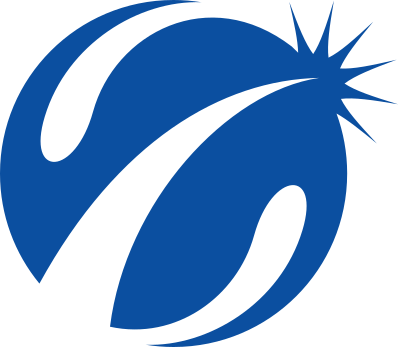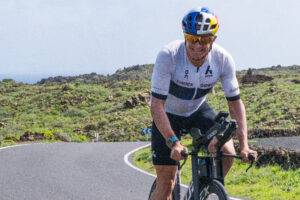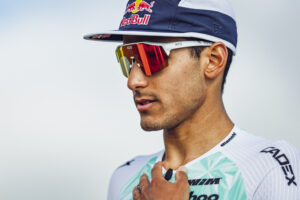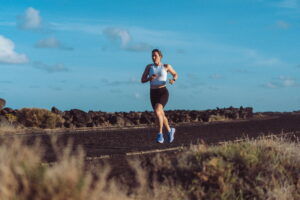Stark raving fast IM bike split

On November 4, Andrew Starykowicz won Ironman Florida on the strength of an amazing 4:04:39 bike split that smashed Andreas Raelert’s world-best Ironman-distance bike split mark, set at Challenge Roth in 2011, by 7 minutes and 4 seconds.
Making that performance even more remarkable, Starykowicz suffered a broken collar bone, serious nerve damage and pushed the head of his right humerus through the labrum in an accidental collision with an aid station volunteer while leading the March 3 Abu Dhabi International Triathlon. After the crash, Starykowicz stopped to make sure that the volunteer was receiving medical attention before continuing, but his injuries forced him to withdraw after finishing the bike. After a month in which he was held by United Arab Emirates authorities who contemplated charging him with manslaughter, Starykowicz was released after paying a substantial bond. After surgery and a remarkably swift rehabilitation, he returned to competition in October, placing 1st and 2nd at two Rev3 half Ironman distance races before his win at Florida. In his 4th race in 6 weeks he placed 7th at Ironman Arizona where his 4:16 split broke the course bike record by 6 minutes.
Starykowicz’s road to his record ride began when he competed in several sports while earning a degree in mechanical engineering at Purdue University. He won a Big Ten championship in water polo in 2001 and achieved All-American honors in swimming (2000) and triathlon (2002-2005). While working for the Caterpillar Corporation as an engineer from 2005-2009, he was a successful age group triathlete with dominating bike capabilities. He turned pro in 2006 and in 2009 set a still standing IM 70.3 World Championship bike split record of 1:58:49 while finishing 24th overall. In 2011, he won Rev3 Cedar Point, Rev3 South Carolina and the Rev3 Race Series. In other races in 2011, he was first off the bike at Abu Dhabi, Chicago, LA and Rev 3 Quassy.
Starykowicz wrapped up a Tale of Two Cities “best of times, worst of times” 2012 by marrying fiancée Jill Cwik on December 1st. He reflected on his career and his future in an interview with Slowtwitch conducted via email.
Slowtwitch: What do you think about the great cyclists of the Ironman – including Wolfgang Dittrich, who led many of Mark Allen’s and Dave Scott’s wins off the bike, Jurgen Zack, Thomas Hellriegel, Normann Stadler, Torbjorn Sindballe, Chris Lieto and Andreas Raelert — who held the Ironman distance bike split record before you?
Andrew Starykowicz: Those are some big names who are the backbone of triathlon history. I am very aware of them, their accomplishments and their impacts on the famous races and on the history of the sport. I have familiarity with all of them, but for now I will hold my comments.
ST: How would you rate the relative difficulty of the Florida course?
Andrew: Every course has its challenges. Florida is so flat that you actually have to focus harder than a hilly course. Every second is an opportunity to gain inches on your competitors when in deep focus, but if you drift off you lose those inches. At Florida the swim was fun for me because it was a bit choppy, but apparently this is out of character for the race. On the bike you need to maintain constant effort in an aero tuck for hours on end, no breaks to stretch out or get out of the saddle. The run is more of the same, no areas to stride out, change leg cadence or change muscles being fired. It is an easy course to complete, but to go really fast (NOT IN A PACK) it is relentless.
ST: You came to IM Florida without a perfect taper after a strong effort at Rev 3 races. How hard did you go at that half Ironman distance race the week before and what was your condition coming into Florida?
Andrew: I went much further into the tank at Rev3 Florida than Ironman Florida. When the swim at Rev3 Florida was cancelled for 10-foot waves, I really had to think about how to race that day with Ironman Florida looming. I hadn't really trained for Ironman so I decided to go all cards in at the Rev3, because I was peaked for the half Ironman distance. I dogged the first short run at 5:15 pace but lost a minute to the leaders. I dropped the hammer on the bike and arrived in T2 3 minutes ahead of bike-run specialist Jesse Thomas and more than 8 minutes over Kaleb VanOrt, Viktor Zyemtsev, and Richie Cunningham. I rode sub-2 hours and my legs were cramping bad from the start of the half marathon. I pushed hard to try and fend off Jesse but he got me at Mile 11.5 and he broke me at Mile 12.5. After the race I could not walk. I got stretched by Kevin Maggs (a chiropractor on the Rev3 staff) after the race. Ironman Florida race week then went like so: 1 hour spin on Monday, a short swim and 2 hour massage on Tuesday, Wednesday off. Thursday was a short swim and bike. Friday was a short swim and run. Then race Ironman Florida on Saturday with 6 days of rest and light movement. Text book taper, right?
ST: How did the rough water affect your swim and your strength throughout Ironman Florida?
Andrew: Rough water swims really benefit me. The rough waters really seem to separate those who can swim from those who rely on wetsuits to keep up. Physically stronger swimmers also have an advantage because they can maintain stroke efficiency even when the waves make you feel as if you are in a washing machine.

ST: When did you start to feel in synch on the ride?
Andrew: I found my rhythm in the opening miles of the bike and never lost it.
ST: Was your strategy to blast the bike and hang on in the run – or did you moderate your pace with an eye to the run and a win?
Andrew: I raced the race. Ironman is still triathlon. Swim, bike, and then run with the goal to get from the start line to the finish line as fast as possible. For an event that takes 8 hours, I would not advise to "blast" any particular part of the race. A constant relentless pace works best.
ST: How did you feel starting the run? And how did you calculate your pace to fend off the 2:49 marathon of Jan Raphael and the 2:47 of Scott DeFillipis?
Andrew: I felt surprisingly good getting off the bike. My legs had some cramps but they were not bad. I went out with the intention of running a three hour marathon. I calculated at mile 20 that Jan Raphael had to run well over 1 minute faster per mile than me. So I slowed a bit at the aid stations to make sure to evade a meltdown.
ST: What was the toughest point of the run?
Andrew: The toughest part of the run was the whole thing. It was really hard to keep my head and throttle back. I am a hammer head which is why I love the Olympic distance — 6:50s per mile seem so slow when you start the run.
ST: What did you feel when victory was at hand?
Andrew: I cannot describe the emotion when I hit the chute. The roller coaster of life this year went from the hell of wrongful imprisonment in Abu Dhabi and shoulder reconstruction to a special orbit that few will ever understand.
ST: What did the win mean to you? And what by comparison did the bike record mean to you?
Andrew: The bike split meant more because I won the race. When I set the 70.3 bike split record in 2009 (which still stands) I was not winning big races. By setting the bike split record and winning it in the fastest American Ironman time in the last decade [8:06:17] I showed the type of triathlete that I have trained to be — a champion.
ST: While you smashed the old record on the bike, what could you have done better?
Andrew: I did have quite a few very minor mistakes but they did not affect me on the bike. However, they hurt me on the run. It was as close to a perfect ride that I could put together.
ST: Given your Florida experience, what do you think is the limit of an Ironman bike split on a fast course?
Andrew: With the goal to win, a faster split is possible but unlikely, even by me.
ST: With your engineer’s analytical mind, knowing the terrain, wind, heat and humidity of Kona, what might be the ultimate limit on that bike course?
Andrew: Don't know much about the Hawaii course so I have no idea. The race has never been on my immediate radar.

ST: What were some of the strong moments and the trying moments on your Ironman Florida ride?
Andrew: I was strong the whole way through the bike at Florida. I had a massive cramp at mile 53 in my quad which I massaged away. The second half of the ride I had micro-cramping and discomfort as expected for being locked in aero position, pushing the threshold for hours on end.
ST: How did the stiff frame and carbon fiber design of your Orbea play into your superb split?
Andrew: The new Ordu was key to my success this fall. The bike is stiff and allows me to really stomp on the pedals to deliver mind boggling speed for hours on end. The Orbea Ordu's frame geometry takes the energy delivered by my legs and transfers every bit of it to the road with less drag than ever before. The new Ordu is designed not only for aerodynamics but also for ride quality which really separates it from the super bikes on the market. Many of the super bikes have a very rigid ride because they are designed for wind tunnel aerodynamics and do not account for real world riding conditions. The Ordu really takes advantage of carbon technology by integrating sharp angles in the tubes to dissipate road noise (vibrations) and not sacrifice frame stiffness.
ST: How much work have you done with Orbea engineers and designers on your bike in testing?
Andrew: No work was done on my bike specifically. I am riding an off-the-shelf Ordu frame. I have never been on my bike in the wind tunnel. The testing that I did was on a smaller prototype frame in which we played with shaping of tubes and different ratios.
ST: What is your height, weight, and muscle proportion?
Andrew: I am 6'2", 180lbs in race trim. I have a lot of muscle and I like to use it!
ST: What if any compromises does your physique present a challenge on the run?
Andrew: I have unusually long femurs combined with a solid slab of muscle over them from years of pushing wheel barrows, treading water, and lifting weights that help my cycling. The other big part is that I am innately efficient at pedaling, unlike running where I look like a large monkey. Over the years I have worked to become more efficient, but no gorilla will ever run like a cheetah.
ST: What advances in training, nutrition, bike fit have made the biggest improvement in your already strong cycling?
Andrew: There is no big secret. It is a culmination of years of nose to the grindstone, balls to the wall, hard training and racing of the Olympic distance and then having to spend a year in base mode that allowed me to have such a surprising comeback this fall.

ST: What makes your Florida race even more amazing is your recovery from extensive injuries at Abu Dhabi. While it is clear after two excellent races at Rev3 you had come back a long way, how far from your peak fitness were you at Florida?
Andrew: I feel I was pretty far from the fitness I had this spring. I lacked endurance and speed in the swim and run. But my bike endurance and threshold power were there and it showed.
ST: How much your Abu Dhabi injuries restrict your movement and what did it take to rehab?
Andrew: I still have injuries from Abu Dhabi. I have a large hematoma above my right hip which still wakes me up every time I roll onto my side. My left shoulder has a sizable tear in the rotator cuff. My ankle has not been the same since the crash. I am still very restricted.
ST: What medical and rehab treatment did you receive?
Andrew: For my right shoulder I sought out one the best shoulder doctors in the world, Dr. Anthony A. Romeo of Midwest Orthopaedics at Rush, and a great physical therapist, Perry Rich from Athletico Barrington. Thanks to their work, I was able to get enough range of motion safely and timely enough to race this fall.
ST: Did they expect your rapid recovery?
Andrew: Neither expected that I would recover as quickly as I did. They anticipated I would be back swimming in November and healthy enough to compete by January.
ST: How much did your experience in Abu Dhabi depress or discourage you?
Andrew: I was severely depressed. I was screwed by race management and then robbed by the Abu Dhabi traffic prosecutor. I knew I would have waltzed away with the win, so I came back to prove to everyone else that fact. After dominance at Rev3 South Carolina and Ironman Florida, nobody should have a doubt.
ST: After such a long time in rehab, how did you do 4 races in 6 weeks?
Andrew: Whenever it hurt, I just thought about what I have been through and realized this little hurt is nothing compared to the suffering this spring and summer.

ST: Nice bike race record in Arizona [4:16:34 – six minutes better than the race record and 2:29 better than T.J. Tollakson on the day]. When did you realize that you were a bit drained and this race would not go as well as Florida?
Andrew: Arizona is a 3-loop course on the bike after the first loop I was 2.5 minutes faster than anybody. The last 2 loops I simply maintained the same lead for two reasons. 1) Too much deja vu from Abu Dhabi. With age groupers weaving all over the place, I was unable to keep that killer focus. 2) The wear and tear of the previous 3 races plus a raging sinus cold drained me.
ST: How does the Arizona course and the weather conditions compare to Florida?
Andrew: The do not compare at all. Tropical vs. desert, flat vs. false flats, single loop vs. multiple out-and-backs with crowds of age groupers on the final laps. The list goes on.
ST: Given your success in those two races, I imagine you will be aiming at Kona in 2013. How optimistic are you about tackling the Ironman crown jewel?
Andrew: I just got home from my honeymoon and I honestly have not looked to 2013 yet. This fall I did every big race I could after I was cleared to race before my wedding. Unfortunately for me, two of them were over 140 miles long. That said, to get to Kona I need to chase points in order to qualify. Contrary to what most people think, the pros pay an entry fee and for all the travel. I earned $5,000 for winning Florida and am not qualified for Kona.
ST: Given your Olympic distance and half Ironman success, do you feel that Ironman will be your best distance?
Andrew: I hope not. Not a fan of the distance.
ST: During your convalescence you put together a book on swim sets. Why swimming and not biking?
Andrew: For Swimmers 365 Main Sets is an incredible resource. In my spreadsheets of workouts collected over the years it just came natural. I have not heard of a swim coach ever say ‘Today you are going out for an easy 45 minute swim.’ It is always in the form of a set, and it always has some level of difficulty. I do have a nice list of bike sets, but that book will require a lot more time due to dialogue of how each set is to be used.

ST: What can you do to improve your run? What balance can you achieve between taking advantage of your bike – and preserving enough energy for a winning run?
Andrew: I have been slowly improving my run. When I started the sport I ran a 10K at what is now my marathon pace. My run has always been a work in progress, but so has my swim and bike. As I have matured, I have gotten better at finding that balance and pushing myself to the brink every time.
ST: How important are those power output numbers to your training?
Andrew: In training they are extremely important, in a race I do not go by wattage. You can ask the CyceOps people how much strain I put on a hub.
ST: What in your athletic background prepared you for triathlon?
Andrew: My competitive nature. Anything I do I want to be the best. In swimming I wanted to be the best at every event, so eventually I became an Individual Medley specialist. In water polo I wanted to be able to elevate higher and stay up longer than anybody so I developed this mad leg strength. It all molded me for triathlon….everything but running that is!
ST: When you are flying on the bike, can you describe the alpha sensation when everything is going right?
Andrew: It is a thrill. It feels as beautiful as the sounds of a perfectly honed symphony orchestra performing Beethoven, Bach, or Rachmaninoff.
ST: What races will you focus on next year?
Andrew: Next season is up in the air. The Toyota/Lifetime pro series is gone, there are a lot of races that WTC ditched that have a great history and are lacking a home. Then there are independent races — Challenge coming to North America, Rev3 and their ever expanding series. I can tell you I will not be doing Abu Dhabi or any of the other IMG events.
ST: Are you at all disappointed that Lance Armstrong won’t be around to duel on the bike in triathlons?
Andrew: Yes
ST: Have you ever competed as an elite in cycling? If so, how did you do? If not, are you tempted?
Andrew: I raced a lot cycling races until 2006. I am a penultimate lead out man — 900 watts for 30 seconds on tired legs. The thing is, cycling is a team sport and I never really could find a team that wanted to work with a “triathlete." They all wanted me to break away and ride a personal time trial. That said, I have always loved cycling. It is in my blood. My grandfather is 90 and still riding every day. When it is on television I watch it. Yet the reality is that I am one of very few at the top of the triathlon world. Yes, I could race with those guys, but I would be a domestíque and one of a hundred guys you've never heard of.
ST: I suspect the triathlon world will hear a lot from you next year.

[Publisher's note: According to sources at IMG, Andrew did have returned to him the diyya – the traditional bond paid in such cases as these.]








Start the discussion at forum.slowtwitch.com